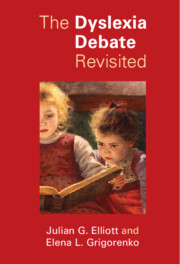
-
Select format
-
- Publisher:
- Cambridge University Press
- Publication date:
- March 2024
- April 2024
- ISBN:
- 9781009083140
- 9781316514443
- 9781009078665
- Dimensions:
- (228 x 152 mm)
- Weight & Pages:
- 0.78kg, 452 Pages
- Dimensions:
- (228 x 152 mm)
- Weight & Pages:
- 0.65kg, 456 Pages
- Subjects:
- Psychology, Cognition, Educational Psychology
You may already have access via personal or institutional login- Subjects:
- Psychology, Cognition, Educational Psychology
Book description
In every country, and in every language, a significant proportion of children struggle to master the skill of reading. In 2014, The Dyslexia Debate examined the problematic interpretation of the term 'dyslexia' as well as questioning its efficacy as a diagnosis. Ten years on, The Dyslexia Debate Revisited reflects on the changes in dyslexia assessment and treatment over the last decade, including the introduction of dyslexia legislation in many US states. Addressing the critical responses to their original challenge of the dyslexia construct, Julian G. Elliott and Elena L. Grigorenko also consider why, despite scientific critiques, existing dyslexia conceptions and assessment practices continue to be highly attractive to many professionals, individuals, and families. Based on current scientific knowledge, the authors strive to promote a shared understanding of reading difficulties and emphasize the importance of providing timely and appropriate intervention and support to anyone who faces difficulties with learning to read.
Reviews
‘Regardless of your view of the debate they present, there are some particularly useful chapters in this book that are definitely worth reading.’
Source: Dyslexia Review
‘Elliott and Grigorenko maintain their critical stance but provide updated conclusions and constructive recommendations, making this work essential reading for researchers, practitioners, and policymakers alike. Their call for a more nuanced, needs-based framework contributes meaningfully to ongoing debates in the field. … Highly recommended.’
T. B. H. Brown Source: CHOICE
Contents
Metrics
Altmetric attention score
Full text views
Full text views help Loading metrics...
Loading metrics...
* Views captured on Cambridge Core between #date#. This data will be updated every 24 hours.
Usage data cannot currently be displayed.
Accessibility standard: Unknown
Why this information is here
This section outlines the accessibility features of this content - including support for screen readers, full keyboard navigation and high-contrast display options. This may not be relevant for you.
Accessibility Information
Accessibility compliance for the PDF of this book is currently unknown and may be updated in the future.


